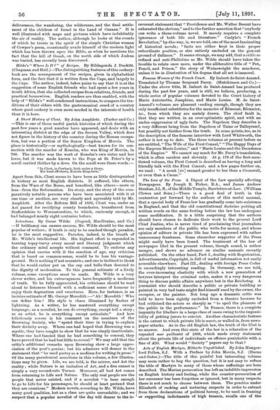Intentions. By Oscar Wilde. (Osgood, Macllvaine, and Co.) — If
brilliancy can ensure success, Mr. Wilde should be the most popular of writers ; if truth is only to be reached though paradox, he is the most suggestive. Paradox, indeed, is the breath of Mr. Wilde's intellectual life. His highest effort is expended in turning topsy-turvy every moral and literary judgment which the ordinary mind accepts without comment. To endorse any opinion that carries with it the sanction of age, any criticism that is based on common-sense, would be to lose his vantage- ground. He is nothing if not eccentric; and one is inclined to think that he would rather put on the cap and bells than descend to the dignity of moderation. To this general estimate of a lively volume, some exceptions must be made. Mr. Wilde is a very clever writer, and his extravagances have frequently a modicum of truth. To be fully appreciated, his criticisms should be read aloud to listeners blessed with a sufficient sense of humour to enjoy their dogmatism and smartness. Here, for instance, is an incisive estimate of Mr. George Meredith :—" Ah ! Meredith ! Who can define him ? His style is chaos illumined by flashes of lightning. As a writer, he has mastered everything except language ; as a novelist, he can do everything, except tell a story ; as an artist, he is everything except articulate." And how felicitously severe is his comment on the members of the Browning Society, who "spend their time in trying to explain their divinity away. Where one had hoped that Browning was a mystic, they have sought to show that he was simply inarticulate. Where one had fancied that he had something to conceal, they have proved that he had but little to reveal." We may add that the critic's additional remarks upon Browning show a large appre- ciation of the poet's genius ; but his admirers will demur to the statement that "he used poetry as a medium for writing in prose." Of the many paradoxical assertions in this volume, a few illustra- tions may be given. Life, we are told, is the mirror, and Art the reality ; while Nature is an imitation of Art, and a fine sunset is simply a very second-rate Turner. Moreover, all bad Art comes from returning to Life and Nature. The only real people are the people that never existed, and if a novelist "is base enough to go to Life for his personages, he should at least pretend that they are creations." Modern novels, according to Mr. Wilde, have many good qualities, but as a class are quite unreadable; and we suspect that a popular novelist of the day will demur to the ir-
reverent abatement that " Providence and Mr. Walter Besant have exhausted the obvious," and to the further assertion that "anybody can write a three-volume novel. It merely requires a complete ignorance of both life and literature." Carlyle's "French Revolution," by-the-way, is, we are told, one of the most fascinating of historical novels ; "facts are either kept in their proper subordinate position, or else entirely excluded on the general ground of dullness." It seems strange, we may add, that a critic so refined and anti-Philistine as Mr. Wilde should have taken the trouble to relate once more, under the alliterative title of "Pen, Pencil, and Poison," the story of Wainewright the murderer, unless it be in illustration of his dogma that all art is immoral.


































 Previous page
Previous page